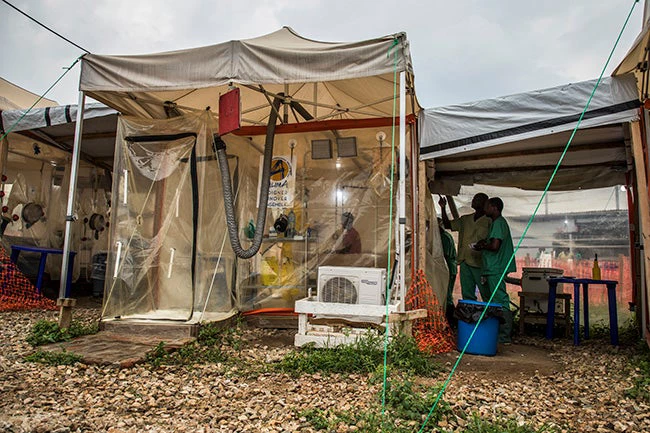
For several years, Ebola has been ravaging our continent, especially communities in Central and West Africa. It is exacting a severe human toll and causing significant economic losses in places already burdened by extreme poverty. My homeland, the Democratic Republic of Congo, is now battling its tenth Ebola outbreak since 1976.
Many observers view the devastation wrought by this disease as a reflection of our weak health systems, which are incapable of responding to such shocks. Others point to the difficulty that partners face in coordinating their actions. Each new epidemic outbreak triggers a familiar series of responses: health care providers mobilize along with technical and financial partners, vast material and human resources are deployed, the media begins telling the story, and so on.
What lessons can we learn from these successive but separate epidemics? Before joining the World Bank as a public health specialist, I was a doctor working deep in rural DRC, where I was dealing with my sixth epidemic outbreak. I have learned three key lessons from my experiences.
First, each epidemic has its own distinct characteristics. Taking the geographical, sociocultural, or economic context into account and tailoring our response accordingly is of paramount importance. Second, marshaling resources—considerable though they may be—is not enough if sound mechanisms are not in place to facilitate coordination among the partners working to contain the epidemic. And third—the most important lesson in my view—communities must take ownership of the response if Ebola transmission is to be stopped.
In 2007, while on a supervision mission to rural hospitals in Mweka, a town in the Kasaï province, I heard from health personnel about an unusual influx of patients with persistent fevers, diarrhea, and stomach aches accompanied by vomiting. During a hospital visit, we learned about the case of a young boy who had died a few hours earlier and had presented with hemorrhagic symptoms. Once such symptoms are mentioned, the word “Ebola” immediately springs to mind, but your first reaction is to dismiss this thought. A WHO colleague at the hospital nonetheless suggested that a blood sample be taken. The diagnosis was unequivocal. However, I keep asking myself one question: despite recurring epidemics in the country, why are we—medical personnel—still taking so much time to detect Ebola?
All of us who have worked as doctors in Sub-Saharan Africa know that these symptoms are a part of daily life and could be related to malaria or typhoid fever, both common diseases. When a new Ebola outbreak was detected in Mweka in 2008, the community got involved at the first signs of the disease, helping to detect and quickly eradicate the epidemic. Once community awareness had been raised—with communities not viewed as victims but as full partners—they assumed ownership of the response. They effectively monitored contacts, actively searched for patients who had dropped out of sight, and provided social and psychological support to affected persons.
Hence it is critical for communities to play a leading role in planning health care programs. We know that community resistance has hampered the efforts of health specialists in Béni, North Kivu, the epicenter of the ongoing tenth Ebola outbreak in DRC. But communities are our best ally if we hope to halt the epidemic.” Community health workers play a key role, sharing information throughout communities and detecting the first signs.
Our efforts to combat Ebola tend to overemphasize the medical aspect of the response and have focused mainly on our financial, logistical, and technical resources. The paradox with Ebola is that while we do need considerable resources, including state-of-the art treatment centers with doctors and nurses in astronaut suits, leveraging communities to contain the epidemic is equally, if not more, important. This is why the World Bank Group, a key participant in efforts to combat Ebola, is focusing on community participation as a critical element in battling this epidemic.
However, we should not be naive. Community action is a long-term effort, and building trust between communities and the providers in health facilities is crucial. Successfully continuing key personal and food hygiene practices—which tend to be discontinued once an epidemic has been eradicated—will hinge greatly on the degree of community involvement. When I visit households that have been affected by Ebola, I am sometimes shocked to learn that some of my fellow citizens are still eating bush meat in high-risk areas. But this is also the reality: extremely poor communities must do whatever they can to survive.
After all, Ebola is also, and above all, a development challenge. Helping communities earn a living, by creating jobs or other income-earning opportunities while also improving access to health services and education, is ultimately our best defense against Ebola.


Join the Conversation